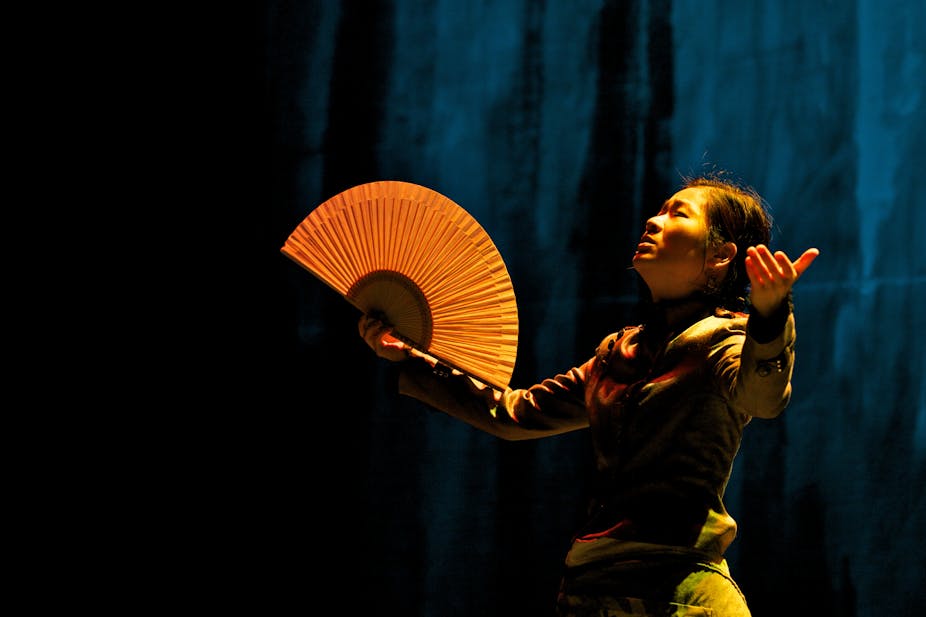Bertolt Brecht’s Mother Courage and Her Children (1941) is, alongside Beckett’s Waiting for Godot (1953), the defining dramatic text of post-war European theatre. Few, if any, theatrical images are as iconic or evocative as that of German actress Helene Weigel’s battered war-profiteer in Brecht’s original production, having lost all her children (and her horses), hitching herself to her wagon, and drawing it, broken yet unrepentent, into the oblivion of a blasted, post-apocalyptic warscape. Jaram Lee’s reworking of Mother Courage as a Pansori performance at the Sydney Festival makes for stunning, exhilarating theatre.
Mother Courage is a trader following the armies of the 30 Years War (in Brecht; dynastic Chinese wars in this production) across the battlefields of Europe. Along the way, she loses each of her children because, as Brecht makes clear, her “courage” — her highly developed will to survive — leads to terrible decisions. A recruiting officer seduces her son as she is distracted by bargaining over a belt; later, her unwillingness to hand over her wagon — her livelihood — as ransom for her other son, leads to his death.
In Brecht’s penultimate scene, Courage and her mute daughter are camped outside a village. A raiding party appears. Courage’s daughter climbs to a rooftop and alerts the villagers by beating a drum. She is shot, killed by the raiders.
Courage, cradling her dead daughter, sings a lullaby, before, in Brecht’s famous staging, haggling with locals about the cost of her burial. A regiment passes in the background: “got to get back in business again”, she sighs; “…take me along!”
Brecht’s Courage has learnt nothing. Yet she is not entirely to blame, but trapped by circumstance, victim and perpetrator of the all-consuming logic of war (when peace threatens, she fears having over-capitalised in war merchandise, and longs for war to resume).

Brecht’s Courage is a survivor, then, but at what cost? Brecht is sublimely ambivalent. While his reputation as a Marxist precedes him, along with the suspicion that his plays are doctrinaire and didactic, less attention is paid to his interest in Taoism, his commitment to complexity and working through and around problems, rather than seeing the world in black and white, good and bad.
UKCHUK-GA: Pansori Mother Courage
Pansori is a centuries-old Korean form of story-telling, performed by a solo singer accompanied by a drummer.
This is ideal for Brecht’s “epic” theatre, a style in which players “narrate” characters and episodes, holding them up for examination and analysis, slipping in and out of character, building, through comedy, asides, and often direct address, a conspiratorial rapport with spectators, offering implicit and explicit commentary on the action.
In Pansori, the vocalist does all this alone. Here, the astounding Jarem Lee performs the entirety of Brecht’s play, showing us over a dozen characters, abruptly switching, with the flick of her fan, from full-throated, wrenching, almost melodramatic, emotional intensity, to calm-voiced story-teller. Every now and then she begs the audience’s permission to stop for a glass of water before launching into the next episode.
This production is more, though, than a Pansori “version”. It is certainly not reverentially traditional either with regard to the “Intangible Cultural Heritage” status of Pansori, nor to a canonical Brecht. Nowhere is this more apparent than in the music: Lee is accompanied not just by single drummer, but by a three piece percussion combo, driven by a particularly funky electric bassplayer.

And although I saw, in some of Lee’s gestures and embodiment, knowing echoes of Weigel’s seminal 1950s performance (there is a film of the production that toured Western Europe, astounding English and French audiences), this production stakes out its own affective, political, and aesthetic, territory.
Most strikingly, the work is exhaustingly, thrillingly, viscerally, emotional. Pansori vocal style allows for breathtaking range and dynamics. For over two hours, Lee achieves extraordinary things, including sustained, full-bodied howls of grief and despair as the world rains blow after blow upon Ukchuk/Courage. At the end, Lee apologises for making us cry, before expressing her own (faux) horror at the prospect of having to perform the whole thing again tomorrow night.
At the same time, this hyper-emotionality sets it slightly at odds with traditional, Brechtian interpretations; with, for example, the famous open-mouthed silent scream with which Weigel’s Courage responds to her son’s off-stage death.
Tellingly, this production’s final image offers Courage/Ukchuk something of a redemption. Rather than lurching off into the distance, she ascends a ramp. The upstage curtains part, and celestial light falls upon her through a smoke-machine haze. It’s less Brecht than the ecstasy of Saint Theresa.
But that’s carping. As the smoke settled, and Lee returned to the centre of the stage she had so comprehensively made her own, the audience leapt, cheering, to its feet; we had seen something very special. The standard has been set pretty high for Robyn Nevin, who will take on the role for Belvoir in June.
UKCHUK-GA: Pansori Mother Courage played at the Sydney Festival January 19 and 20. Details here.

